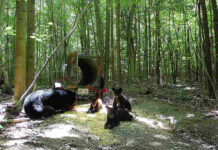I once informally banned the word “proactive” from Farm and Dairy pages because it had become so overused, it was almost a cliché, i.e. “we need to be more proactive.”
But if there’s ever a time for farmers to think more “proactively” it’s now, against the backdrop of courtroom lawsuits and environmental riptides.
I hope you read the article in last week’s Farm and Dairy (“Farmers safe from lawsuits if they help with research”). The EPA amnesty program of sorts shelters livestock producers from Clean Air Act violations and lawsuits if they agree and pay to participate in a research program. The goal is get hard data on onfarm emissions before regulators step in and pluck figures from the air.
Worthy effort? Yes. Cheap? No.
Will independent farmers participate? Doubtful. Should they? Probably.
Current air quality research is cloudy when it comes to agriculture. And air quality regulations could impact your farm as strongly as water quality regulations.
As N.Y. dairyman Doug Shelmidine put it in an open letter to his dairy peers: “Ignoring air emission regulations won’t make them go away.”
* * *
More food for thought: The City of Waco is suing 14 dairies in the Bosque River Water Basin for allegedly polluting the city’s primary source of drinking water, Lake Waco.
According to the Stephenville (Texas) Empire-Tribune, the city alleges the dairies have failed to properly handle liquid and solid waste and names phosphorus as the single pollutant contributing to the river’s pollution.
This situation has been building for more than three years. In fact, a Texas A&M ag economist calls the North Bosque “one of the most studied watershed in the country.” It’s also one of the most regulated.
The situation spilled into the halls of city councils, the state natural resources’ department, then flooded the halls of the state legislature.
It’s a complicated situation, muddied by politics and emotion on both sides.
To its credit, the area’s Texas Association of Dairymen offers a manure management certification program to its members. The Agricultural Producers Certification Option covers Comprehensive Nutrient Management Plan development and implementation, and a third party audit of the implemented manure management plan on an annual basis to maintain certification.
No one should be surprised at the latest litigation; there have been other suits in the region. But producers nationwide should be served notice: Clean up your house.
Manure manager certification programs in both Ohio and Pennsylvania are a good start, no matter what size your operation.
* * *
On a lighter note, I’ll close on this fun reminder from the Council of State Governments:
Q. Which came first? The chicken or the egg?
A. The farmer.
Get 4 Weeks of Farm and Dairy Home Delivered









